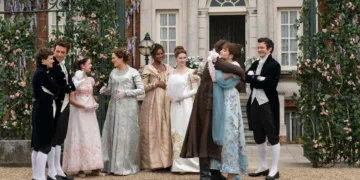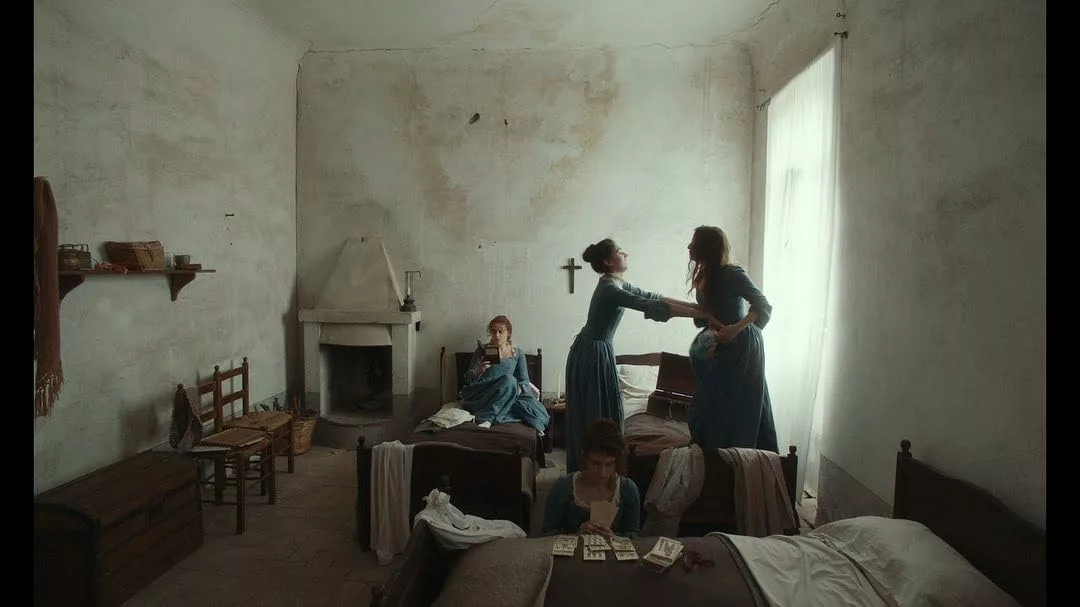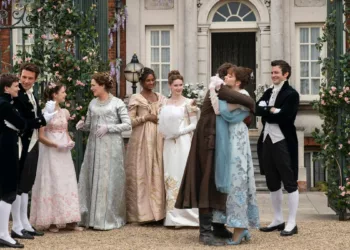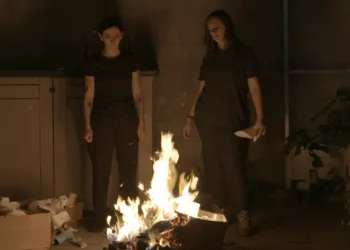Margherita Vicario makes an impressive directorial debut with Gloria!, a delightful period piece that brings a forgotten history of women composers and musicians to life. As an actor, musician, and third generation entertainer herself, Vicario imbues this film with personal passion. She sets her sights on the early 19th century, when orphanages across Italy fostered musical talents in young women only to have their futures indefinitely shuttered.
Though not based on a specific true story, Gloria! pays tribute to the countless forgotten talents of the past through its tale of hope and rebellion. We open on the Saint Ignazio College, where a musically gifted servant girl called “The Mute” scrubs the floors as she hears melodies in the everyday sounds around her. Little do her superiors know, Teresa has symphonies at her fingertips waiting to get out.
When a piano prototype falls into her hands, this Cinderella-esque heroine finds her voice and bands together with other young women to challenge the strict divisions at Saint Ignazio. Prepare for clashes between tradition and innovation, with anachronistic pop compositions symbolizing the unstoppable creative spirit. Vicario may be making her first feature, but her confident direction and musical background hint that we’ll be seeing much more from this rising talent.
Music and Rebellion Behind Cloistered Walls
Gloria! transports us back to the year 1800 inside the walls of the Saint Ignazio College, a cloistered musical institute for orphaned girls. Here, a servant girl named Teresa performs menial chores under the nickname “The Mute.” Though mute in voice, Teresa hears melodies everywhere. She also hides a traumatic past involving an illegitimate child. The strict hierarchy at Saint Ignazio has no room for Teresa’s talents. That changes when she stumbles upon a piano prototype locked away in the basement by the imperious chapel master, Perlina.
This instrument awakens something in Teresa, who begins teaching herself to play forbidden pop-inspired compositions way ahead of their time. When a group of girls from the Saint Ignazio orchestra, including violinist Lucia, discover the source of this music, conflict gives way to solidarity. United by a shared gift for creativity Perlina ignores, Teresa, Lucia, and their friends make a pact to take turns practicing in secret.
The harmony hits a sour note with news of Pope Pius VII’s upcoming visit. Tasked with impressing the Pope, a struggling Perlina has no time for the girls’ musical rebellion. Rejecting Lucia’s offer to help compose, Perlina doubles down on tradition, pushing the women further toward defiance.
As pressures mount toward the Pope’s celebration concert, Teresa and Lucia recognize Perlina lacks the talent Saint Ignazio expects. Seizing their chance, the women set out to showcase their visionary compositions. Friendships are tested and rules broken in the final crescendo, leading to a chaotic performance which scandalizes some and awes others. The future of Saint Ignazio hangs in the balance. But through creativity’s triumph, the forgotten legacies of past women composers finally resound.
The Sound of the Future Echoes from the Past
At its heart, Gloria! is an ode to the unheard melodies of history. Vicario constructs her narrative around interwoven themes of women’s empowerment, clashes between tradition and innovation, and the lost legacies of women composers and musicians. These themes harmonize through the relationships of the film’s characters and their rebellious pursuit of creative freedom.
The strict hierarchy and dated musical philosophy of Saint Ignazio serve as an antagonist embodying the patriarchal erasure of women’s cultural contributions. Chaplin master Perlina leads an orchestra practising stale religious hymns, deaf to the burgeoning talents under his direction. Forbidden from participating, Teresa and her friends turn to clandestine late-night jam sessions fuelled by pop-inspired compositions centuries ahead of their time. In these scenes, the piano prototype unlocked from its basement prison becomes a symbol of artistic liberation.
By injecting anachronistic musical styles into the 19th century soundscape, Vicario establishes tension between convention and boundary-breaking. She suggests her protagonists hear the future of music—one where creative identity conquers institutional bounds. As Teresa masters the mysterious piano, she gives voice to generations of women limited by their gender and status. Her story becomes one of vindication for forgotten composers and freedom for future creators.
In a standout sequence, Teresa’s domestic duties transform into a rhythmic ensemble performance, underscoring music’s infiltration of even mundane daily life. Moments like these cement Gloria! as a soaring tribute to women’s creative power – one that has echoed unseen through history and permeates worlds to come. When performed for the Pope himself, these defiant compositions stun and divide, but their lasting resonance is resoundingly clear.
Through show-stopping clashes and cathartic crescendos, Gloria! celebrates unshackled creativity as an enduring force for revolution. Like the heroines at its heart, this film’s boundary-breaking spirit remains its crowning triumph.
A Visionary Production Guided by Captivating Performances
Anchoring Gloria! is a stellar lead performance from Galatéa Bellugi, who brings heartbreaking pathos and defiant inspiration to the role of Teresa. With minimal dialogue early on, Bellugi’s soulful expressions convey volumes about her character’s traumatic past and innate musical gifts. This Cinderella-esque heroine becomes an anchor for the film’s themes to resonate. Bellugi’s impassioned playing also fuels Teresa’s emotional journey toward sisterhood with Lucia, embodied with haughty zeal by Carlotta Gamba.
While the supporting ensemble leans toward broadly sketched archetypes, lively camaraderie shines through in the young women’s clandestine rehearsals. As chapel master Perlina, Paolo Rossi summons sufficient pompousness to represent the film’sstuffy antagonistic force. More impactful is Perlina’s unspoken longing for his former lover Cristiano, allowing Rossito infuse humanity into an otherwise one-note character.
Central to the film’s essence is Vicario’s musical background, which enlivens both her directing vision and original compositions. Contemporary melodies echoing from Teresa’s piano become conduits to the historically obscured musical identities of women. Vicario capably builds anesthetic grounded in period details yet imbued with anachronistic modernity in costumes and instrumentation.
The orchestration of production design, cinematography, and music combine to create an atmospheric tribute to sounds both forgotten and visionary. Guiding this technical symphony with confidence, Vicario injects every frame with reverence for the enduring legacy of women’s creativity.
A Triumphant Testament to Creative Freedom
Brimming with vivacious energy and pops of anachronistic flair, Gloria! announces the arrival of a promising new directorial talent in Margherita Vicario. What the film may lack in narrative innovation, it makes up for with Technical prowess, soul-stirring music, and a timely message celebrating liberation through creativity. Within familiar beats of rivalry and rebellion, Vicario puts the spotlight on an overlooked history of women composers while envisioning a future where their talents take center stage.
Led by Galatéa Bellugi’s affecting performance as muse-like protagonist Teresa, the film’s spunky young women band together to find freedom outside rigid social codes restricting their artistry. Their fight resonates as a euphoric tribute to self-expression without bounds. While some plot points strain credulity and certain characters verge on archetypes, Gloria! ultimately strikes a chord with its earnest endorsement of music’s timeless power to break barriers.
Gloria! makes for a crowd-pleasing watch best enjoyed for Bellugi’s star-making turn and Vicario’s sensational musical sequences. Fans of films like Sister Act seeking lightweight period escapism with a wink of modernity will find their new favorite underdog story. But anyone with a soft spot for overcoming adversity through creativity will be singing this film’s praises. Both mainstream viewers and arthouse crowds should let Gloria!’s high notes lift their spirits.
The Review
Gloria!
Though its plot borders on formulaic, Gloria! triumphs on the strength of its spritely vision and song-fueled heart. Carried by the harmonies of its talented cast, Margherita Vicario’s film debut hits all the necessary inspirational notes to offer a pleasantly uplifting period drama celebrating liberation through music. Its message of reclaiming creative female voices echoes loudly from the past into the future.
PROS
- Galatéa Bellugi gives an affecting lead performance
- The music by Vicario and DADE is sensational and catchy
- Creative direction and aesthetically pleasing production design
- Timely and uplifting message about women's empowerment
- Crowd-pleasing, feel-good tone with mainstream appeal
CONS
- Plot borders on formulaic at times
- Some supporting characters verge into archetypes
- Narrative ties up a bit too neatly and conveniently
- Could have pushed creative risks and anachronisms further



























